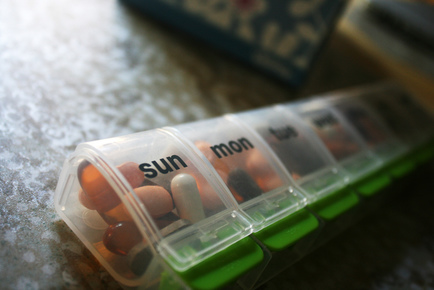
Don't give up, though - supplementation can help, especially when you're just starting or are in the middle of improving your diet and lifestyle - going for less of the stuff that comes out of a sealed package or can and more of that stuff that actually grew in the ground. Interested in suggestions?
My go-to guy for advice and guidelines is Henry Emmons, MD, an integrative psychiatrist and the author of The Chemistry of Joy, the Chemistry of Calm, associated workbooks and a new book, Staying Sharp. He and his colleagues at Partners in Resilience in Minneapolis have written a series of excellent articles with practical recommendations for physical and mental health from a holistic, but non-woowoo perspective.
Here's an excerpt from his overview of 'Basic Nutritional Support' for people with depression and anxiety. The full article gives more specifics.
Here are the basic supplements that I recommend.
Remember that not everyone needs these, and if you do take them, you don’t need to stay on them forever. They are supplements, and when you feel balanced and all is well in your world, chances are you no longer need them.
Basic Supplements (may use occasionally, seasonally or indefinitely)
All may be taken with meals, although you may get more out of the probiotics if taken on an empty stomach. All are safe to be used long-term. If you’re recovering from depression or anxiety, I would suggest taking them for at least 6 months. If you take any of them twice daily, it is best to do so with breakfast and supper.
1) Multivitamin and/or B Complex
Both if the Bs aren't included in the multi. Twice a day with food, lower doses if diet is okay, higher if not.
2) Omega 3
Start with a balanced EPA/DHA product. Begin with 1 capsule twice daily. If mood symptoms are not improving after 1 month, increase by 2 additional capsules per day. You may keep increasing each month up to a total of 8 capsules daily if needed.
You don’t have to take fish oil in order to get omega 3 (although people with mood disorders may benefit more from fish oil). Less expensive food sources include: 2 T. ground flax seeds per day, or 1-2 T. daily of chia seeds, hemp seeds or pumpkin seeds per day.
3) Vitamin D3
Take 2,000 IU daily if you have some sun exposure, or if blood levels are low normal. Take 5,000 IU daily if no sun exposure/very low blood levels.
You should not need to take Vitamin D if you are in the sun for 15-20 minutes most days between April and October, or if you have a normal vitamin D blood level. By the way, I like the blood level to be above 40, even though most labs consider 20 or 30 to be normal.
4) Probiotics
Take 1 or 2 daily before breakfast, on an empty stomach if possible.
This is optional if you get plenty of probiotics in your diet by eating yogurt, kefir or other foods with live cultures at least 3-4 times per week. However, an imbalance in the healthy gut bacteria is one of the common hidden causes of mood and anxiety disorders. If you have taken large numbers of antibiotics, have a lot of gut issues, or simply are not recovering from mood or anxiety problems, I strongly recommend a probiotic.
5) Magnesium Citrate or Glycinate
Take 400-800 mg daily. It can work as a mild laxative: if you get loose stools, simply reduce the dose.
Magnesium is an important part of the process by which serotonin and other brain chemicals are made. It is also calming in its own right, so I recommend it for anxiety, insomnia and muscle tension.
Magnesium is often combined with calcium, which many people take for bone health; note that most men should not need extra calcium, and many women can get enough of it in their diets as well. But if you do take both, it is more economical to get them together in a single tablet.
That’s all the basic supplements you should need.
If you're interested in recommendations keyed to your age, lifestyle, health status and symptoms, take a look at Dr. Andrew Weil's Vitamin Advisor service, which provides a supplement plan based on your responses to a questionnaire. While the plan directs you to products from their shop, most the vitamins suggested could be purchased elsewhere.
 RSS Feed
RSS Feed